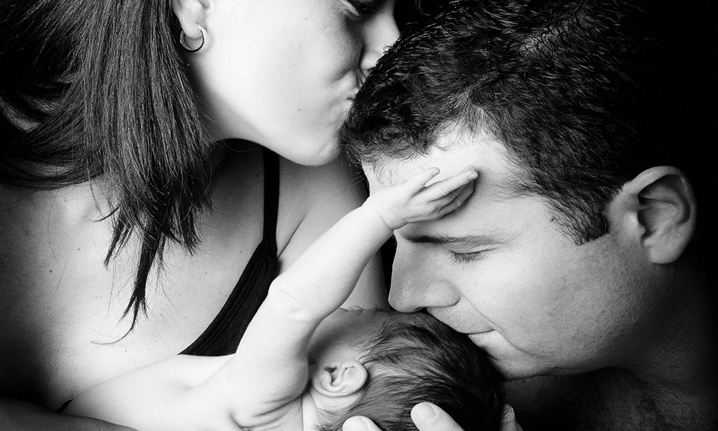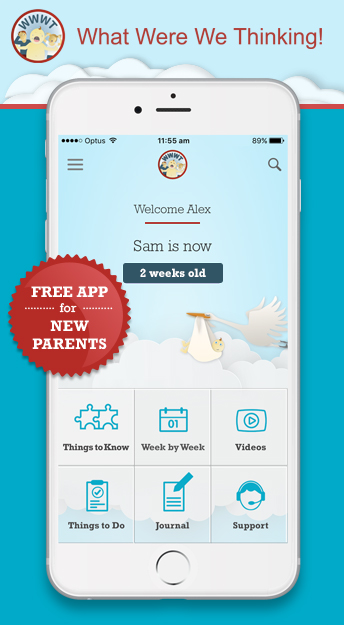What you give up when gaining a baby
By John

“I’ve given up my body and my life, what have you given up?” my wife asked before I headed out to play a team sport.
“What do you mean?” I responded, only to get a nasty reply.
Apparently my wife had made huge sacrifices in her life to have our child. She went through the experience of rearing a child and ‘disfiguring’ her body and she gave up her job to spend all day looking after our baby, but I – on the other hand - still had the opportunity to go out and play sport with my mates for a few hours on the weekend. I also still had the same prenatal body and my full-time job. In her eyes, it seemed, my life hadn’t changed and I hadn’t sacrificed as much as her which she thought wasn’t fair.
I had a different approach to being a first time parent, trying to fit parenthood in with my life rather than trying to fit my life in around parenthood. It was seen as unfair that I wasn’t making as big a sacrifice as my wife when it came to parenting. I hadn’t been calibrated properly; apparently my life was meant to revolve around my child rather than my child fit in with my life.
Having a child certainly had a huge impact on me, with some of those changes not entirely obvious to my wife. The big one, which I felt went unnoticed, was that I had to manage the family budget (with increased expenditure and a reduced income) which definitely wasn’t easy. I think it was also forgotten that any time I spent parenting was in addition to working a full time job.
I’m sure I’m not alone in experiencing the handover on arrival home from work.
“It’s your turn to look after him, I’ve been doing it all day!” my wife would cry as soon as I stepped foot in the door.
Hang on a minute, do you think I’ve been on a holiday? I’ve been busting a nut at work all day and now I’m expected to continue doing what has burnt you out for the entire day? Despite me working full-time, my wife still expected me to provide an equal amount of parental support.
On several occasions I tried to present her with a ‘peace offering’ but it was rarely taken up. I suggested that my wife go and participate in some personal activities, such as yoga which she loves, and that I would look after our baby. The offer was constantly declined and I’m not sure whether she felt I was incapable of looking after our son alone or that she wanted to keep the argument under her belt that she had made more sacrifices in her life than me.
We’re lucky enough to have a child that sleeps for a few hours during the middle of the day so there is a good period of time for relaxation. Yes, admittedly there are some limitations on what you can do, but overall, looking after him during the day isn’t too stressful. However before work, and when I get home from work, I consider this to be full-on parenting time with breakfast or dinner preparation, bathing, dressing, play and story time all needing to be covered. These times also happen to be the only times I’m at home and the time my wife expects me to take over her post.
When was I allowed time for myself? Why was I getting told off and made to feel guilty for allocating a few hours to playing sport? Our communication has definitely improved now that our son is a little older, but at the time I felt I should have been able to have a few hours alone on the weekend, or spend a night after work relaxing, without being blasted for being a bad parent or getting the cold shoulder for not making enough sacrifice in my life.
Working partners need a bit of a break too.
Expert response from What Were We Thinking! expert, Sue Doogan
Congratulations John for having the courage to speak up for the working partner! You make some very valid points in a clear and concise way.
As you state John, the stress of being financially responsible to manage the family budget (with increased expenditure and a reduced income) is enormous for most partners. We think we have worked out our single salary budget when we are pregnant, but nothing prepares you for the cost of all the incidental accoutrements we buy when the baby is actually here (the fact that we actually don’t need half of these purchases is another blog entirely!)
Apart from the financial aspect, the usual responses that a partner receives – “you can get out of the house”, “you get a lunch break”, “you can leave your work at the end of the day” – is an injustice to the stress and strain of working full-time. This full-time work can sometimes be in a job you possibly dislike, and now can’t leave, a job that adds another few hours to your day with commuting or one where you may be operating heavy machinery and need your reflexes in tune – the list goes on.
Every new parent, in varying degrees, will experience a range of emotions they may never have experienced before along with extreme tiredness. For each couple, or individual, this is not a score card as to who is more tired than the other. As we all know, tiredness brings about less tolerance or misinterpretations of comments or behaviours. It is extremely important at this point to realise that you are both struggling, most likely from different emotions and needs, and it is critical you communicate with each other.
Our biggest mistake is assuming our partner “should know what I need” or “what needs to be done” or “Can’t they see how tired I am?” In short, the answer is no. Your partner is also struggling. At a time when we should be communicating more, the majority of couples communicate less and tend to tip-toe around each other for fear of causing upset.
There is no magical formula I’m afraid. There is no right or wrong way to muddle through this new aspect of your lives and relationship. It is all dependant on your own values and morals, your family of origin and whether you want to parent as you were parented or whether you want to change some aspects. Of course, in the heat of the moment, everyone thinks that there is nothing wrong with the way they were raised but with some self-reflection there can always be some aspects of parenting that we’d like to do differently to our own mums and dads.
John, you suggested a peace offering which was rejected by your partner. A number of mums have said to me that even though their partners have encouraged them to leave the house for some ‘me’ time, they too have been reluctant to do this – particularly in the early weeks and months after having a baby. Most of them, like your partner, also struggled to put into words why they hadn’t taken up the offer. Some volunteered that they just couldn’t leave their baby despite wanting a breather, that they trusted their partner implicitly however when it came to actually leaving the house the pull-on-the-heart-strings was too much.
For the stay at home parent, if you are offered some respite (but don’t feel you can take it for whatever reason) you can’t then turn the tables and start the blame or guilt game. Sitting in your garden getting some fresh air whilst reading or listening to music is a great start as you move towards leaving the house to attend a yoga class for example. The baby will be fine, as too your partner!
As parents we are very quick to teach children the basics of ‘please’ and ‘thank you’ or to ‘look left’ when crossing the road or how to take turns in conversations or actions. When you consider that children learn an enormous amount by observing and listening to our behaviour, language, actions, one of the biggest lessons we rarely show our children is to look after ourselves – ‘me’ time’. It is a healthier family when the children observe parents taking time out to do a physical or mental activity on a regular basis, separate to family activities. In time, it shows the children that as individuals we are all in need of some private time regardless of whether we are the ‘working’ partner or the ‘stay at home’ partner. By doing this we actually become better parents as our stress levels are decreased and our wanting to be present with our children is increased.
I would suggest to parents revisiting some of the activities from the program framework including Speaking up for yourself, The things you say and do along with Losses and gains. It never hurts to refresh our learning.
We need to communicate with each other in a respectful and courteous manner every single day to transition from coupledom to a happy, healthy, functioning family unit. Working inside or outside the home are equally important aspects of parenting, just remember to openly and honestly communicate with each other – your baby will thrive as a result!
Posted in: A new reality Baby 0-4 weeks Dads In this together Your needs








